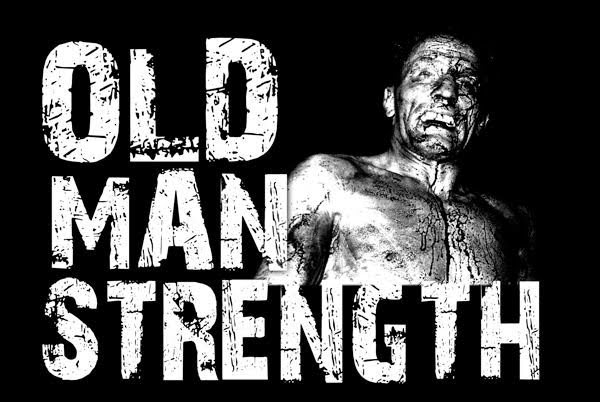Health & Fitness
What Is This ‘Old Man Strength’ Thing?


Older guys often appear to have tremendous power for their age. It’s known as “old man strength.” Is it, however, a genuine phenomenon? Is it true that elderly men preserve their strength? Or possibly become more powerful?
Some believe that stress hormones are to blame for old man strength. People have been known to gain virtually superhuman strength in stressful conditions. Nick Harris of Kansas, for example, managed to lift a car in 2009 to liberate a six-year-old kid trapped beneath it.
The body swings into fight-or-flight mode in these situations, producing chemicals like adrenaline. These hormones increase arousal, attentiveness, and processing speed, preparing the body for action. They also improve skeletal muscle blood flow and neuronal drive. This reaction, when combined, can result in increased muscular strength and power.
Increases in the production of adrenaline-related hormones with age have been suggested as a possible explanation for older men’s seeming capacity to execute incredible feats of strength. There is, however, no experimental evidence that greater production of these hormones improves strength in older persons. In fact, compared to a younger individual, an older adult’s capacity to maintain a regulated powerful muscular contraction is reduced after a “stressor.” Similarly, high levels of the noradrenaline hormone associated with aging are linked to slower processing speed and cognitive function, which has a deleterious impact on fine motor control.
Age-related muscle loss, known as sarcopenia (from the Greek sarx, “flesh,” and penia, “poor”), also contradicts the concept of old manpower. In other words, as we get older, starting about the age of 40, we gradually lose muscle mass until our muscles are roughly half the size they were when we were 40.
Because muscle cross-sectional area and strength are connected, the loss of strength that comes with aging is matched by the decrease of muscle mass. Hormonal changes associated with aging are also a contributing factor. While adrenaline levels rise with age, chemicals that control muscle mass and strength, such as testosterone and growth hormone, fall.
Is It thus a Mistake to Believe In Old Man Strength?

This isn’t to say that just because you’re elderly doesn’t mean you can’t stay strong or even get stronger. Consider the case of Charles Eugster. The 96-year-old Englishman can do 61 45-degree chin-ups in 45 seconds after starting weight training at the age of 87.
Simply being more active in later life and participating in low-intensity exercise programs or completing ordinary manual activities can improve strength and mobility in the elderly population, allowing them to live a healthy and independent life. Indeed, this is likely what makes your father look stronger while lifting paving slabs, for example, because he is used to it and strength might vary depending on the work.
Lifting weights on a regular basis as you become older improves your strength and muscle mass. In fact, weight training has been proven to raise hormone levels in older individuals to the same level as untrained younger adults. However, these improvements will almost certainly never match those of a younger adult who begins and completes the same exercise at the same time. All other factors being equal, there will almost always be a disparity in strength, power, coordination, and muscle mass.
The media’s portrayals of old men’s tenacity definitely don’t tell the whole story. An older guy who holds a strength record has most likely been exercising since he was a child and has continued to do so as he has gotten older, allowing him to keep his strength and muscle mass at a higher level for longer. He may be a freak of nature if he isn’t.
CLICK HERE: FOR MORE READING ABOUT UPDATED TIME
It goes without saying that most stories of old man strength are undoubtedly overblown. This is why we don’t see elderly individuals competing on an equal basis with younger counterparts in sporting events, and why we have age divisions in sports competitions: records tend to slip with age. Of course, there are exceptions to any rule. Mark Felix, who is 50 years old, is a perfect illustration of this. At the World Strongest Man competition, he is still able to compete with much younger competitors.
Health & Fitness
Spain GEDmatch 999915: Unraveling Your Spanish Ancestry with Precision

Table of Contents
Spain has a rich and diverse genetic history shaped by centuries of migrations, invasions, and cultural exchanges. Understanding Spanish ancestry requires advanced tools, and GEDmatch provides one of the most specialized options available.
The Spain GEDmatch 999915 calculator is designed to analyze DNA and break it down into specific Iberian and related components. This tool helps individuals with Spanish roots uncover their genetic heritage in greater detail.
Unlike generic DNA ancestry reports, this calculator provides deeper insight into the historical influences that shaped the Spanish gene pool. It can reveal connections to ancient civilizations like the Iberians, Romans, and Moors.
For those exploring their family history, this tool is an excellent resource. Whether you have recent Spanish ancestors or distant Iberian roots, using Spain GEDmatch 999915 can offer a clearer picture of your genetic background.
Understanding GEDmatch and Admixture Calculators
GEDmatch is a free online platform that allows users to analyze their raw DNA data. It provides advanced genetic tools that are not available on most commercial DNA testing websites.
One of the most useful features on GEDmatch is the admixture calculator, which breaks down a person’s DNA into regional and ethnic components. These calculators use different reference populations to estimate ancestral origins.
Not all calculators are created equal. Some are broad, covering entire continents, while others, like Spain GEDmatch 999915, focus on specific regions. This makes it more precise for those with Spanish ancestry.
- Standard DNA tests from companies like AncestryDNA and 23andMe provide only a general view of ancestry.
- Spain GEDmatch 999915 goes further by identifying Iberian, Mediterranean, North African, and other Spanish influences.
- This tool helps in tracing deeper genetic connections beyond what typical DNA tests offer.
By using this calculator, users can gain a more detailed and historically accurate understanding of their genetic roots.
Spain GEDmatch 999915: What It Analyzes
The Spain GEDmatch 999915 calculator is designed to break down Iberian DNA into specific regional influences. It uses a detailed genetic reference panel to provide accurate estimates.
This tool identifies different ancestral components present in Spanish DNA. Spain’s location has made it a crossroads of civilizations, and this is reflected in its genetic diversity.
One of the key advantages of Spain GEDmatch 999915 is its ability to detect subtle genetic influences from different migrations. This helps users see how various groups contributed to their heritage.
In comparison to general European calculators, this tool provides higher accuracy for individuals with Spanish ancestry. It distinguishes Iberian DNA from other European, Mediterranean, and African influences.
Understanding the results requires some background knowledge of Spanish history and migrations, which will help in interpreting the DNA breakdown.
The Genetic Makeup of Spain
Spain’s genetics are shaped by centuries of migration, conquest, and cultural blending. The population carries traces of many historical civilizations.
- Iberian Influence: The indigenous people of the Iberian Peninsula form the core genetic base of modern Spaniards. Their DNA is still dominant, especially in central and southern Spain.
- Mediterranean Influence: The Greeks and Phoenicians settled in Spain, introducing Mediterranean genetic markers. These influences are stronger in coastal areas.
- North African Influence: The Moors ruled Spain for over 700 years, leaving a genetic impact, particularly in Andalusia.
- Celtic Influence: Northern Spain, especially Galicia and Asturias, has strong Celtic ancestry. The region’s people share DNA similarities with the Irish and Scots.
- Sephardic Jewish Heritage: Spain had a large Jewish population before their expulsion in 1492. Some Spanish families still carry Sephardic Jewish genetic markers.
Each of these influences is detected by Spain GEDmatch 999915, making it an essential tool for understanding Spanish ancestry.
How to Use the Spain GEDmatch 999915 Calculator
Using Spain GEDmatch 999915 is simple, but it requires raw DNA data from a testing service like 23andMe, AncestryDNA, or MyHeritage.
First, users must upload their DNA file to GEDmatch. Once uploaded, they can access various tools, including the admixture calculators.
To get Spanish ancestry details, users need to select Spain GEDmatch 999915 from the admixture section. The tool will analyze the DNA and provide a breakdown of regional genetic influences.
Interpreting the results requires looking at percentage distributions. If a person has high Iberian, Mediterranean, or North African percentages, it reflects historical migrations and ancestry.
For best results, it is recommended to compare findings with historical and genealogical records. This can help confirm family origins and better understand ancestry.
Benefits of Using Spain GEDmatch 999915
This tool is valuable for individuals who want deeper insights into their Spanish heritage. Unlike standard DNA tests, it offers more precise details on Iberian genetic composition.
One major benefit is that it helps users distinguish between different Spanish regional ancestries. For example, it can highlight if a person has strong Galician, Andalusian, or Basque genetic roots.
It also provides insight into historical migrations that shaped Spain. Knowing about these influences can help individuals connect with their past in a meaningful way.
For those interested in genealogy, Spain GEDmatch 999915 is a great tool for confirming family history. It can validate or challenge existing records and family stories.
Overall, this calculator enhances the understanding of Spanish ancestry beyond what commercial DNA tests can offer.
Limitations and Considerations
While Spain GEDmatch 999915 is a powerful tool, it is not 100% accurate. DNA calculators rely on reference samples, which can sometimes lead to minor discrepancies.
The tool works best when used alongside other genealogy research. Historical records, family trees, and oral histories should be considered when interpreting results.
Another limitation is that genetic overlap exists between Iberians and neighboring regions. Some results may show small percentages of Italian, Greek, or North African ancestry due to ancient migrations.
Users should also keep in mind that DNA inheritance is random. Siblings can receive different genetic percentages, even if they share the same parents.
Despite these limitations, Spain GEDmatch 999915 remains one of the best tools available for understanding Spanish genetic heritage.
Other Useful GEDmatch Tools for Spanish Ancestry
In addition to Spain GEDmatch 999915, there are other GEDmatch calculators that can further refine Spanish ancestry analysis.
Some European-focused tools like Eurogenes K13 and MDLP World can provide additional context by comparing Spanish DNA to other European populations.
GEDmatch also offers DNA cousin matching, which helps users find relatives based on shared DNA segments. This can be useful for expanding family history research.
Using multiple tools can provide a more complete picture of ancestry. Spain GEDmatch 999915 is an excellent starting point, but cross-referencing with other tools can enhance accuracy.
For those serious about genealogy and ancestry research, combining GEDmatch tools with historical records can produce more reliable and meaningful results.
Conclusion
Spain’s genetic history is rich and diverse, influenced by various civilizations over thousands of years. Spain GEDmatch 999915 helps individuals explore this complex heritage in detail.
By using this tool, users can gain a better understanding of their Spanish ancestry and how historical events shaped their DNA.
Although no DNA calculator is perfect, Spain GEDmatch 999915 provides one of the most accurate options for those with Iberian roots.
For anyone curious about their Spanish lineage, this tool is a valuable resource that can provide meaningful insights into their past.
FAQs
What is Spain GEDmatch 999915?
It is a specialized DNA calculator on GEDmatch that analyzes Spanish and Iberian ancestry in detail.
How accurate is Spain GEDmatch 999915?
While it provides precise regional ancestry insights, results may vary due to genetic overlaps and reference samples.
Can Spain GEDmatch 999915 detect Sephardic Jewish ancestry?
Yes, it can identify Sephardic Jewish markers, but confirmation requires historical records or additional DNA analysis.
Do I need a commercial DNA test to use Spain GEDmatch 999915?
Yes, you must first test with services like 23andMe, AncestryDNA, or MyHeritage and upload the raw data to GEDmatch.
Does Spain GEDmatch 999915 show exact locations of ancestry?
No, it provides regional genetic influences rather than pinpointing specific towns or villages in Spain.
Food & Drink
Sauer Condiment NYT: Tangy Flavors That Elevate Every Meal

Table of Contents
“Sauer,” the German word for “sour,” represents an entire world of tangy, fermented flavors that have been loved for centuries. Sauer condiment nyt, like sauerkraut, pickles, and fermented sauces, is known for its bold taste and ability to complement various dishes. These condiments are more than just a culinary addition—they tell a story of tradition, health, and innovation.
Historical Origins
The history of sauer condiments dates back to ancient times when fermentation was a necessity for preserving food. In Germany and Eastern Europe, people used fermentation to extend the shelf life of vegetables during long winters. Sauerkraut, for instance, originated as a practical way to store cabbage but quickly became a staple in the diet. Over time, the tangy flavors spread across the world, influencing cuisines far beyond their origins.
Types of Sauer Condiments
There are many kinds of sauer condiments, each with unique characteristics:
- Sauerkraut: This is finely shredded cabbage fermented in brine. It’s a classic German condiment often served with sausages and pork dishes.
- Kimchi: A Korean favorite, kimchi is a spicy, fermented vegetable mix, typically made with cabbage, radishes, and chili peppers.
- Pickled Vegetables: From cucumbers to carrots, pickling involves soaking vegetables in vinegar or saltwater brine, resulting in a tangy crunch.
- Fermented Sauces: Soy sauce, miso, and other tangy condiments add depth to many Asian dishes.
Health Benefits
Sauer condiments are not only delicious but also incredibly nutritious:
- They are rich in probiotics, beneficial bacteria that support gut health and digestion.
- The fermentation process increases the vitamin content of the food, especially vitamins C and K.
- Regular consumption of fermented foods can boost the immune system and improve overall health.
Culinary Uses of Sauer Condiments
Sauer condiments are versatile and can enhance a variety of dishes:
- Sauerkraut is a perfect match for sausages, hot dogs, and sandwiches.
- Kimchi adds a spicy kick to rice dishes, soups, and noodles.
- Pickled vegetables make excellent snacks, side dishes, or additions to burgers and wraps.
- Fermented sauces like soy sauce and miso enrich the flavors of marinades, soups, and stir-fries.
The Science of Fermentation
Fermentation is the magic behind sauer condiments. It’s a process where lactic acid bacteria break down sugars in vegetables, producing lactic acid. This not only gives the condiments their signature tangy flavor but also preserves the food by preventing harmful bacteria from growing. The balance of salt, sourness, and time is key to achieving the perfect fermentation.
Modern Trends in Sauer Condiments
Today, sauer condiments are enjoying a resurgence in popularity, thanks to the growing interest in health-conscious eating and artisanal foods. People are experimenting with making their own fermented condiments at home, using creative ingredients and flavors. Specialty stores now offer a wide variety of sauerkraut, kimchi, and pickles, catering to different tastes and dietary preferences.
Cultural Significance and Variations
Sauer condiments hold a special place in many cultures. In Germany, sauerkraut is a symbol of comfort food and is celebrated in traditional meals. In Korea, kimchi is more than just a side dish—it’s a cultural icon and a staple at every meal. Pickling traditions also vary widely, from dill pickles in the U.S. to tangy achar in India. These condiments have even inspired fusion dishes, blending flavors from different cuisines.
How to Make Sauer Condiments at Home
Making sauer condiments at home is simple and rewarding. Here’s a basic method for sauerkraut:
- Shred fresh cabbage and mix it with salt (about 2% of the cabbage weight).
- Massage the cabbage until it releases its juices.
- Pack the cabbage tightly into a clean jar, ensuring it’s submerged in its brine.
- Cover the jar with a cloth or lid and let it ferment at room temperature for 1–4 weeks, tasting occasionally.
Pickling vegetables is just as easy—simply submerge them in a mixture of vinegar, water, salt, and optional spices. The results are tangy, crunchy, and packed with flavor.
Conclusion
Sauer condiments bring together flavor, history, and health benefits in one tangy package. Whether it’s the comforting taste of sauerkraut, the fiery kick of kimchi, or the satisfying crunch of pickles, sauer condiment nyt has earned its place in kitchens worldwide. By exploring sauer condiments, you’re not just adding zest to your meals—you’re embracing a culinary tradition that has stood the test of time. So, why not try making or tasting one today? You might discover a new favorite!
FAQs
What is the difference between sauerkraut and kimchi?
Sauerkraut is made with cabbage and salt, while kimchi includes spices, chili, and additional vegetables for a spicy kick.
How long does it take to ferment sauer condiments at home?
Most sauer condiments, like sauerkraut, take 1–4 weeks to ferment depending on temperature and taste preference.
Are sauer condiments safe to eat if homemade?
Yes, as long as proper hygiene, salt ratios, and airtight fermentation practices are followed to prevent contamination.
Do sauer condiments need to be refrigerated?
After fermentation, refrigeration slows down the process and helps maintain freshness and flavor.
Can I use other vegetables besides cabbage for fermentation?
Absolutely! Vegetables like carrots, radishes, cucumbers, and even beets work great for making sauer condiments.
Article Recommendations
Understanding 810347200593: An Informative Guide
Does a 5.9 Valve Cover Fit n a 6.7: Modifications and Solutions Explained
Aksano Cameras WiFi Purchase USA: Affordable and Reliable Security Cameras
Health & Fitness
How to Choose the Right Plastic Surgeon for You

Table of Contents
Choosing the right plastic surgery procedure is extremely important, but it’s equally valuable to make sure you’re choosing the right surgeon. If you pick someone who doesn’t have the specific skills or expertise you’re looking for you could end up with a result that’s not what you hoped for. Most plastic surgeons perform a number of different procedures, but some of them are specialized in certain areas. Finding the best one for your needs matters and can affect the outcome.
Take a Look at the Work They’ve Done
One of the best ways to know if a particular plastic surgeon is right for your needs is to see the work they’ve done on past patients. Not only can that give you a better idea of their technique, but it can also help you see the end results for a number of people who have had that same procedure. If the results aren’t what you’re hoping for, it’s worth finding out if that’s due to the surgeon you’re considering or other factors.
It may not be possible to get certain types of results with standard plastic surgery procedures depending on the kind of surgery you want and your individual characteristics. However, you still need to choose a surgeon who does great work and who provides the kinds of results you can rely on. In other words, you need a quality surgeon. When you choose a professional like Dr. Joel Aronowitz you want to know that they’re going to give you great results.
Talk to Others and Read Reviews
If you personally know someone who’s had plastic surgery, asking them about their experience and the surgeon they used can help. You can also check out review sites to see what people are saying about a particular surgeon, but remember that not all reviews are accurate. You’ll want to look at the overall rating, because that gives you a good idea of whether people are generally happy with the procedures they’ve gotten from a particular surgeon, such as Joel Aronowitz MD.
The more you can find out about a particular surgeon and the quality of their work the more you can be prepared for what to expect from them. This could also help you rule someone out or find a surgeon you definitely want to work with, even if they have a longer wait time to be seen or to have your surgery scheduled. There are many different reasons you might want to work with a specific surgeon, or why you’d prefer not to, but past work and reviews are great places to start.
Choosing a Surgeon is a Personal Decision
At the end of the day, it’s a very personal thing to choose a plastic surgeon, and you want to feel confident in the selection you make. Especially if you want to correct something that’s been bothering you for a long time, or you’re looking for a very delicate and precise procedure, finding the best surgeon for your needs is worth the time and effort.
-

 Travel4 years ago
Travel4 years agoThe Family of Kirk Passmore Issues a Statement Regarding the Missing Surfer
-

 Technology4 months ago
Technology4 months agoManyroon: The Key to Unlocking Future-Proof Business Solutions
-

 Cryptocurrency1 year ago
Cryptocurrency1 year agoBest Tips For Cryptopronetwork com Contact 2024
-

 Technology3 years ago
Technology3 years agoPaturnpiketollbyplate Login & Account Complete Guide Paturnpike.com
-

 Apps & Software2 years ago
Apps & Software2 years agoFapello 2023: Social Media Platform for NSFW Content
-

 Law3 years ago
Law3 years agoShould I Hire a Lawyer For My Elmiron Case?
-

 Business4 months ago
Business4 months agoCoyyn.com Gig Economy: Smart Contracts and Fair Payments for Freelancers
-

 Business4 months ago
Business4 months agoAcumen: The Key to Smart Decision-Making and Success






